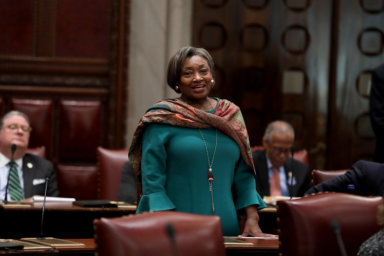State legislature’s one-house bills boost funding for childcare, higher ed

In their one-house budget resolutions released on March 14, both state Senate and Assembly Democrats are calling for significant spending to increase the social safety net in response to the $216 billion Fiscal Year 2022-23 executive budget proposal Gov. Kathy Hochul released in January.
The bills seek to increase spending in a number of areas including childcare, investing in SUNY and CUNY and rent relief for tenants and homeowners. Additionally, the resolutions call for suspending the state’s gas tax in order to provide New Yorkers a break at the pump amid Russia’s ongoing invasion of Ukraine.
In a release, state Senate Majority Leader Andrea Stuart Cousins said the one-house resolution is representative of the upper chamber’s values and will make New York more resilient.
“Our proposal makes historic investments in New Yorkers from cradle to college by laying the foundation for universal, affordable childcare and creating more access to education by implementing a ‘New Deal’ for SUNY and CUNY,” Stuart Cousins said. “With this resolution, we are advancing policies to bolster public safety and protect our communities by investing in mental health resources, gun-violence prevention programs, and the social services our communities deserve. Our one-house resolution speaks to our commitment to boosting the economy, investing in affordable housing, supporting our small businesses, providing tax relief to working and middle-class New Yorkers while protecting the climate and advancing social equity.”
The senate’s bill allocates $4.1 billion for expanding New York’s childcare system over the next decade, while Assembly Democrats are calling for $3 billion in increased funding. In contrast, Hochul’s budget called for $1.4 billion.
“Childcare is a critical service to families and absolutely essential to a strong economy,” said Assembly Speaker Carl Heastie in a release. “The COVID-19 pandemic has caused the closure of many childcare facilities and forced many people, especially women, out of the workforce entirely. Our budget reflects our continued commitment to putting New York families first.”
The increased funding would go toward expanding childcare for households making up to 500 percent of the federal poverty level, grants for childcare providers and infrastructure and restoring funding for several TANF programs.
Both one-house bills also call for bolstering the state and city higher education systems by implementing “New Deals” for both SUNY and CUNY. The Senate bill calls for increasing year-to-year support to the state university system by $600 million and the city university system by $500.
At both the state and city levels the money would go towards hiring new full-time faculty, closing the Tuition Assistance Program (TAP) gap, paying adjunct faculty and lowering the cost of tuition and fees. Both one-house bills also provide significant investments in opportunity programs.
“The Assembly Majority remains dedicated to bringing affordable, quality education to New York students because we know how important higher education can be for a successful future,” Heastie said. “This year’s Assembly budget continues to make critical investments in SUNY, CUNY and opportunity programs to support as many students as possible on their path to a college education.”
Now, both chambers will have to reconcile their budget proposals with Hochul’s proposed executive budget, a process that will likely play out much differently than in past years when former Gov. Andrew Cuomo ran the show in Albany. Any negotiations must happen in the next two weeks, before the state budget’s April 1 deadline.



